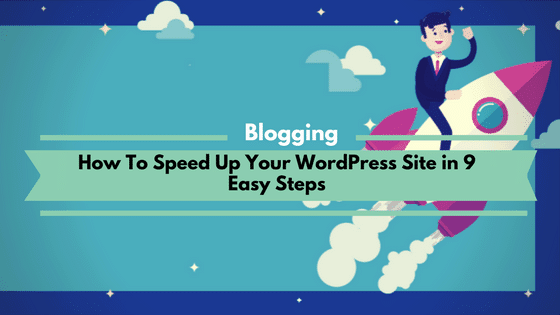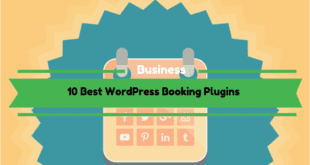Sıralama ve dönüşümler söz konusu olduğunda web sitesi hızı hayati bir rol oynar. Araştırmalar, web sitenizin yüklenmesi 3 saniyeden uzun sürerse ziyaretçilerin %53'ünden fazlasının siteyi terk edeceğini gösteriyor. Ve günümüzdeki rekabet nedeniyle seçeneklerde eksiklik kalmıyor. 9 kolay adımda nasıl hızlandıracağınızı gösterecek
Yani, yavaş web sitesi hızının ve indirme süresinin sitenizin trafiğini ve markanızın güvenilirliğini etkilediğini zaten anlıyorsunuz. Bu nedenle kullanıcı deneyimini geliştirmek ve dönüşümünüzü artırmak için bu sorunu hemen çözmelisiniz.
web sitenizi veya blogunuzu başlatmak için mükemmel bir CMS olsa da , eğer bakımlı değilse web sitenizi önemli ölçüde yavaşlatabilir.
WordPress sitenizin hızını ve performansını hızlandırmak ve optimize etmek istiyorsanız , bunu başarmanıza yardımcı olacak dokuz kolay adımı burada bulabilirsiniz.
İçindekiler
Web Hızı Neden ?
Basit bir gerçek şu ki, eğer bir müşteri web sitenize girerse ve siteniz birkaç saniye içinde yüklenmezse, muhtemelen hayal kırıklığına uğrayacak ve başka bir siteye geçecektir.
Çok sayıda seçeneğin mevcut olduğu bu hızlı dünyada kimsenin oyalanacak vakti yok; bu nedenle, mükemmel bir ilk izlenim bırakmayı başaramazsanız potansiyel müşteri adaylarını kaybedersiniz.
Üstelik Google daha hızlı web sitelerini seviyor . Google, 2020'de Önemli Web Verilerine odaklanan bir güncelleme duyurdu Bu, web sitenizin yüklenme hızının sıralamanızı büyük ölçüde etkileyeceği anlamına gelir. Anahtar kelime düşüşlerinin %80'e kadar trafik kaybı anlamına gelebileceğini biliyoruz. Bunu karşılayamazsın.
Web.dev , GTMetrix , PageSpeed Insights ve Pingdom gibi araçları kullanarak sitenizin hızını düzenli olarak test etmeli ve arama motoru indekslemesini kolaylaştırmak ve ziyaretçilere üstün bir tarama deneyimi sunmak için tüm sorunları ve hataları düzeltmelisiniz.
WordPress Web Sitenizi Hızlandırmak İçin 9 Kolay Adım
Aşağıda web sitenizin hızını, sıralamasını, kullanıcı deneyimini ve sonuçta satışlarını iyileştirmeye yönelik dokuz adım bulunmaktadır.
1. Daha Hızlı Bir Sunucuya Geçin
Host hızı ve satın aldığınız hosting paketi, web sitenizin sayfa hızı ve yükleme süresinde önemli bir rol oynar.
Paylaşımlı barındırma da , büyümeye başladıkça sitenizi sınırlandırır. Barındırma kaynaklarını diğer müşterilerle paylaşırsınız, bu da sunucu hızını etkiler.
Benzer şekilde, ana bilgisayarın hızı da büyük ölçüde sunucu altyapısına ve teknolojisine bağlıdır. Bu nedenle, siteniz yavaşsa, WordPress web sitenizi hızlandırmak .
Premium yönetimli WordPress barındırma, 7/24 destek, ÜCRETSİZ geçişler ve ÜCRETSİZ hız optimizasyon hizmeti sunan WPX.net'i kullanmanızı öneririm WPX'e özel indirimimiz, listeleme barındırma fiyatlarında %10 indirim yapacaktır.



2. Hafif ve Daha Hızlı Bir WP Teması Seçin

Harika görünen ancak çok fazla gereksiz özelliğe sahip bir tema seçmek sitenizin hızına zarar verebilir, bu nedenle WordPress web siteniz veya blogunuz için bir tema seçerken dikkatli olmanız gerekir.
Bu sorunu çözmenin en iyi yolu basit, hafif ve hız için optimize edilmiş bir WordPress teması seçmektir . Bu, web sitenizin her zaman en iyi şekilde çalışmasını sağlayacaktır. Bağlı kuruluş pazarlaması için 50'den fazla önerilen WordPress temasının bir listesi .
3. Gereksiz WordPress Eklentilerini Kaldırın
WordPress ile ilgili en iyi şeylerden biri tonlarca değerli eklentinin . Ancak sitenizde çok fazla gereksiz eklentinin bulunması sitenizin hızını düşürebilir.

Bu nedenle, veritabanınızı optimize etmek için kullanılmayan eklentileri devre dışı bırakmanız veya kaldırmanız gerekir; bu da web sitenizin hızını artırmanıza yardımcı olacaktır. P3 (Plugin Performance Profiler) yardımıyla web sitenizi yavaşlatan eklentileri hızlı bir şekilde tespit edip kaldırabilirsiniz .
4. Etkili Bir WordPress Önbellekleme Eklentisi Kurun
Tarayıcı önbelleğe almayı ve site sıkıştırmayı etkinleştirmek, özellikle tekrar gelen ziyaretçiler için sitenizin daha hızlı yüklenmesini sağlayabilir. Sitenizin önbelleğe alınmış bir sürümünü sunmak, her yeni sorgu için sunucu işlem süresini kısaltacaktır.

Bu nedenle , WordPress web sitenizi büyük ölçüde hızlandırmak istiyorsanız, W3 Total Cache veya WP Super Cache . Ücretli çözümler arıyorsanız, daha fazla tak ve çalıştır özelliğine sahip oldukları için Wp-Rocket'i Her ikisini de Monetize.info'da mükemmel sonuçlarla test ettik.
WordPress web sitenizi tam olarak nasıl hızlandırdığını görmek için WP Roket Eklenti İncelememize göz atın
5. JS ve CSS dosyalarını küçültün
Küçültme, web sitenizin kodlamasındaki fazladan veya istenmeyen beyaz boşlukların kaldırılması anlamına gelir. Bunu yapmak, bu dosyaların boyutunu küçülterek onları daha hafif hale getirebilir ve indirmeyi daha rahat hale getirerek sitenin yükleme süresini ve performansını iyileştirebilir.

En iyi yanı , sorunsuz bir süreç için, WordPress web sitenizdeki HTML dosyalarını da optimize etmenize yardımcı olacak Autoptimize eklentisini
Web sitenizde yapmanız gereken daha fazla teknik optimizasyon için Tam SEO Kontrol Listemizi .
6. İçerik Dağıtım Ağı (CDN) kullanın
Bir sunucunun konumu sitenizin hızını ve yükleme süresini önemli ölçüde etkileyebilir. Örneğin, barındırma sunucunuz Hindistan'da bulunuyorsa, Hindistan'dan gelen bir ziyaretçi sitenizi Londra'dan gelen bir ziyaretçiden daha hızlı görüntüleyebilir ve bu noktada CDN devreye girer .

Bir CDN veya içerik dağıtım ağı, tüm statik dosyalarınızı alıp bunları ziyaretçinize en yakın sunucularda sunarak bu boşluğu doldurmaya yardımcı olur ve web sitenizin tüm dünyada daha hızlı yüklenmesini sağlar. MaxCDN veya Cloudflare gibi doğru CDN'yi kullanmak zorunludur.
7. Sitenizin Görsellerini Optimize Edin
Büyük medya dosyaları ve optimize edilmemiş resimler, web sitesi hızının yavaş olmasının en büyük nedenlerinden bazılarıdır. Sitenize resim veya diğer medya dosyalarını yüklerken, bunların iyi optimize edildiğinden emin olmanız gerekir; çünkü bu, sitenizin sayfa yükleme süresini büyük ölçüde azaltmanıza yardımcı olabilir.

, resimlerinizi otomatik olarak optimize etmenize ve etkili bir şekilde sıkıştırmanıza yardımcı olabilecek WP Smush it (burayı WP Smush Pro'ya ) ve Image Recycle gibi çeşitli eklentilerdir WP-Rocket veya WP Fastest Cache kullanıyorsanız bu eklentiler, görüntüleri yüklemeden hemen sonra otomatik olarak optimize etmek için yerleşik eklentilerle birlikte gelir.
Ayrıca görsellerden bahsedecek olursak görsellerinizi Google Arama için optimize .
#8 – WordPress Veritabanını Optimize Edin
Zamanla, WordPress'i kullanırken veritabanınız, gözden geçirilmezse site hızınızı etkileyebilecek revizyonlar, çöpe atılmış taslaklar, yeni etiketler, tablolar vb. gibi gereksiz verilerle dolma eğilimindedir.

Dolayısıyla bunu önlemek için WordPress veritabanınızı düzenli olarak optimize etmeniz gerekir. Üstelik, bu görevi manuel olarak gerçekleştirebilseniz de, zamandan tasarruf etmek için, veritabanınızı tek tıklamayla otomatik olarak optimize etmenize yardımcı olacak WP -Optimize veya WP-DBManager
#9 – Spam Yorumlarını, Çöp Kutusunu ve Medya Kitaplığını Temizleyin
Spam yorumları sitenizin hızını etkileyerek web sitenizin büyük bir kısmını kaplayabilir ve bu nedenle bunları kalıcı olarak silmeniz gerekir. spam'i otomatik olarak kontrol edip engelleyen, disk alanından tasarruf etmenizi sağlayan ve WordPress web sitenizi hızlandıran Askimet eklentisini kullanabilirsiniz .

Benzer şekilde, çöp kutusuna taşınan herhangi bir gönderi, sayfa veya medya dosyası, kalıcı olarak silinene kadar veritabanında yer kaplamaya devam edecek ve bu da web sayfalarının yavaş yüklenmesine yol açacaktır. Dolayısıyla bu, başa çıkmanız gereken başka bir suçludur.
Son olarak, WordPress medya kitaplığınızdaki geçici ve yedekli medya dosyaları, depolama alanınızı doldurabilir ve web sitenizi yavaşlatabilir. Bu nedenle, sitenizi optimize etmek için bu dosyaları kaldırmanız gerekir; bu, Görüntü Temizleme eklentisinin yardımıyla .
Sen bir teknoloji insanı değilsin ve tüm bunlar sana mı görünüyor? Sorun değil. Seni koruduk. En iyi WordPress bakım hizmetleri listemize göz atın ve bunu sizin için yapacak olanı seçin.Çözüm
Sitenizi hızını ve performansını artıracak şekilde optimize etmek, daha yüksek bir yatırım getirisi elde etmek için çok önemlidir. Yukarıdaki kolay adımlar sitenizin yükleme süresini artırmanıza yardımcı olacaktır; bu nedenle, hemen çıkma oranını azaltmak ve ve sıralamasını artırmak
Ayrıca, WordPress web sitenizi hızlandırma hakkında daha fazla bilgi edinmek istiyorsanız bu uzman özet kılavuzuna göz atabilirsiniz .
 Monetize.info Dijital Varlıklarınızdan Daha İyi Para Kazanmanıza Yardımcı Oluyoruz! 💰👍
Monetize.info Dijital Varlıklarınızdan Daha İyi Para Kazanmanıza Yardımcı Oluyoruz! 💰👍








![Blog nasıl başlatılır? [Ultimate Guide]](http://monetize.info/wp-content/uploads/2019/03/How-a-start-a-blog-Ultimate-Guide-310x165.webp)

Merhaba Nirav,
Bunlar WordPress hızımızı artırmak için temel adımlardan bazılarıdır. İçeriği hızlı bir şekilde sunacağı ve WordPress hızınızı optimize edeceği için CDN benim için harika çalışıyor. Bu yararlı ipuçlarını paylaştığınız için teşekkür ederiz.